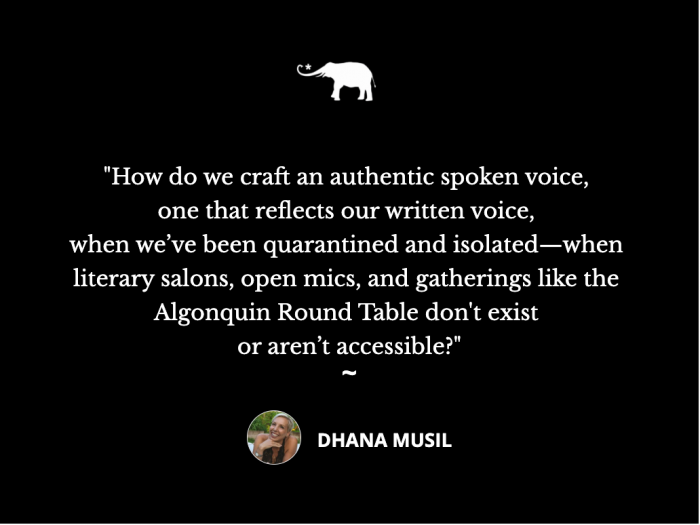~
You found your written voice–but does it match your spoken one?
The Elephant Journal has a fantastic writing course called “Write Your Heart Out.” I’ve taken it twice—once in 2019 and again this past month.
We explore topics such as writing with authenticity, honesty, and specificity.
We delve into topics such as libel and writer’s block and growing your audience.
We share tips and articles on how to show up and be of benefit.
As a community, we embark on a six-week journey to find our written voice, the one that says, “This is me. This is what I stand for.”
Yet what do we do when our written voice doesn’t match our spoken voice?
Most people are shocked, and often dismayed, when they hear their recorded voice. This is normal because it’s usually higher than how we hear ourselves. There’s even a term for it: Voice confrontation. There are various reasons for this happening—one of them has to do with the way sound bounces around our skulls and eardrums before the sound waves make their way to our intended audience and back to us.
But what if it isn’t the sound of our voice that we don’t like—what if it’s some of the words that we are speaking that are disagreeable to us?
Recently, I was an international guest on two episodes of From The Hip, an Australian podcast aimed at mid-life women re-inventing themselves.
Kath and Mish, the podcast hosts, are creative, intelligent women with gorgeous diction and a generous vocabulary. They don’t stutter, or say um, or like, or pause for too long in search of words. These women speak the way I think.
I didn’t listen to the recordings until a week or so after they aired. When I did, I heard nothing but the word “like.” I must have said it at least 20 times during that 20-minute podcast.
In the Netflix series “Maid,” there’s a courtroom scene in which the protagonist hears nothing coming out of the lawyer’s mouth but the word legal—over and over and over.
“Legal, legal, legal, legal.”
That was me listening to my podcast.
“Like, like, like, like.”
What I think, or what I want to say, isn’t what comes out of my mouth.
I want to sound cultured and intelligent like Christiane Amanpour and Amal Clooney. I want the authenticity and charm of Brené Brown. I want Miley Cyrus’s grit and sass. There’s a disconnect between my thoughts and my words. I felt like I was listening to a 1980’s Valley Girl.
If I had listened to the first podcast before we recorded the second one, I could have done damage control. But for me, listening to my recorded voice is like stepping on the scale on the first day of a weight loss journey or sitting down with my accountant at 50 to start some kind of retirement plan.
Scary. As. Sh*t.
I asked my friends if they noticed anything about my interviews. Did anything stand out?
“We loved it! It was so interesting.”
But what about all the times I used the word like?
“Oh, we didn’t notice that. That’s the way you speak. That’s your voice.”
Their well-intentioned remarks gutted me.
That’s how I come across? How and when did this happen?
I thought back to the 1990s when I was studying Japanese full-time at the YWCA in Osaka. Although my grammar and written Japanese weren’t great compared to my primarily Chinese classmates, my vocabulary and conversation skills were excellent. Or so I thought.
Until the day the school principal cornered me in the stairwell.
“Why is it you speak like a gangster?”
Although I had spent a good part of five years in Japan, it had not occurred to me that I spoke an unrefined, masculine Japanese–one spoken primarily amongst the yakuza–Japanese gangsters.
It wasn’t my fault. I’d spent years working in hostess clubs, the stomping grounds for the yakuza, and then I married one. I had minimal contact with any Japanese women, never mind the educated women who spoke refined, high-class Japanese.
My Japanese diction, aka my voice, had developed in response to my environment.
That moment in the stairwell forced me to come to terms with how I presented to the world at large. Although humiliated, I used the information to my advantage and tried to course-correct.
Thirty years later, again, due to exposure to my immediate environment—I’ve had teenagers in the house for the last fifteen years–my English is ripe with slang and fillers such as: like, um, cray-cray, bussin’, totes, and ratchet.
In addition, my career for the past two decades has been teaching yoga to school-aged children, not exactly an environment that fosters complex conversations.
COVID-19 shut down my yoga business, and my monthly writing group called it quits. Between lockdown and homeschooling, my cultural and social well ran dry and most of my conversations rotated around current social media trends and dinner plans.
Herein lies the question: how to craft an authentic spoken voice, one that reflects our written voice, when we’ve been quarantined and isolated—when literary salons, open mics, and gatherings like the Algonquin Round Table don’t exist or aren’t accessible?
~
And then, if we do cultivate it, how do we use it with confidence?
How do we speak our truth even when we feel vulnerable, anxious, and uncomfortable?
Here are six some steps to match our spoken voices to our written ones:
1. Listen and examine what exactly didn’t work.
Since my main issue is my excessive use of the word like, I am banishing it from my vocabulary—unless used in proper context.
2. Like an omniscient narrator, try to observe yourself speak.
Ask: Is it necessary to talk right now? Is what I am saying of benefit or am I engaging solely in nervous chatter?
3. Branch out in your reading to plump up and vary vocabulary.
Read across all genres. Circle words you don’t know or that appeal to you and I keep a list so that you can sprinkle them into conversations.
4. Read books on voice.
In The Power of Voice-A Guide To Making Yourself Heard, Denise Woods coaches Hollywood’s leading actors in finding their unique voiceprint. She writes, “Whether trying to make a crucial societal change or trying to bridge a digital divide, never has it been more apparent that using one’s voice is a key component to positive change, and ultimately, healing.”
5. Listen to podcasts and take note of the way the hosts and guests conduct their interviews.
Some of my favorites are Elizabeth Gilbert’s “Magic Lessons”, Brene Brown’s “Unlocking Us”, and “The Tim Ferriss Show.”
6. Exercise your spoken voice the same way you work out your physical body.
It’s a cumulative effect. The more we put in, the more we get out.
Tonight, I am recording another “From The Hip” episode. If one or two “likes” slip out, well, so be it. I’m not aiming for perfection, but I am striving for constant forward motion.
And isn’t that the goal for us all? To improve how we connect with the world at large? To be of benefit, while staying true to our unique voices—both written and spoken?
~
Author’s Note: at the time of this publishing that third podcast was recorded. And I didn’t use the word like once! I did pause longer than I wanted to when I lost a word, but hey, let’s hear it for progress over perfection!


 Share on bsky
Share on bsky






Read 13 comments and reply